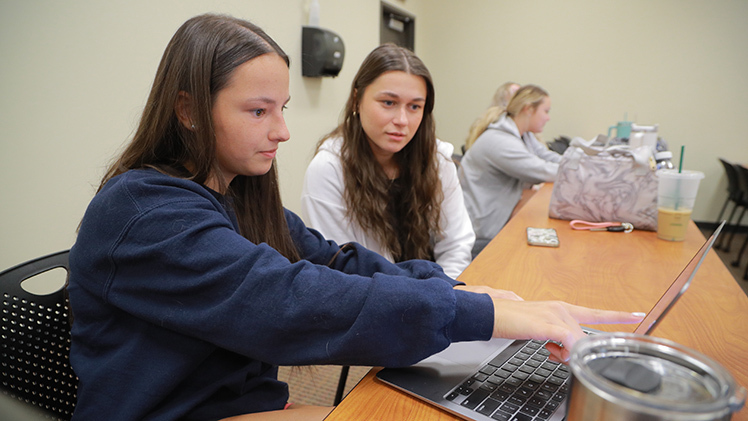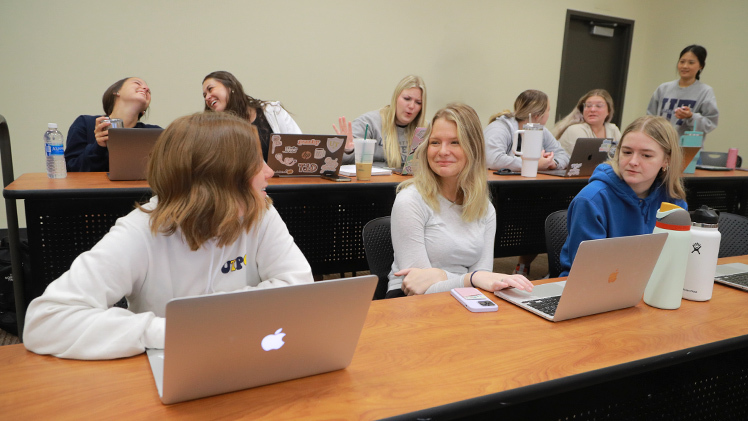Good nurses know there’s more to a patient than what’s written on their chart.
“We look at everything — for example, not just that they came in with a laceration or other ailment,” said Karen Mortland, an instructor in The University of Toledo College of Nursing. “How are you going to get home? How are you going to handle bathing? All of those little details of a person’s life that can be overlooked. In other words, we want to take a holistic view of the patient and look at all their needs.”

From left, Brittany Ellett and Amber Durliat, both senior nursing students, in the Population Health course, which gives fourth-year students in the Bachelor of Science in Nursing Program an inside look at Lucas County Drug Court.
And the unfortunate reality, Mortland said, is that many practicing nurses will come across patients who are struggling with drug addiction and are searching for community support.
Data from the Ohio Department of Health, for example, show there were more than 3,600 visits to northwest Ohio emergency rooms for suspected drug overdoses in 2022, with nearly 1,500 visits in Lucas County alone.
For the last several years, Mortland has focused on that community need in her Population Health course, giving fourth-year students in the Bachelor of Science in Nursing Program an inside look at Lucas County Drug Court.
A jail diversion program of the Lucas County Court of Common Pleas, Lucas County Drug Court provides specialized supervision and treatment for defendants whose substance addiction has led to criminal charges.
Students listen in on the proceedings via a virtual connection to observe interactions between participants in the program and Judge Ian English, who leads the court. During breaks, students have the opportunity to interact with English and ask questions of the judge.
For English, the program offers a chance to show future medical professionals a side of the criminal justice system they wouldn’t otherwise see.
“I am always excited when the nursing students are able to attend our treatment court program,” English said. “It’s a more therapeutic side of the court than what I think the medical field normally engages with and it’s good for the nursing students to see the justice system isn’t just about punishment, but giving people a hand up.”
Among the program’s many positive outcomes, English said, is the ability to reduce the burden on the medical providers who respond to and treat overdoses in Lucas County.
“Those 1,500 individuals are in beds where the person with a heart attack or the child with a broken leg may not be able to get into,” he said, referring to the 2022 county stats on ER visits for a suspected overdose. “It’s not that their medical condition isn’t important — it’s that we can use these resources to avoid them ending up in that hospital bed in the first place.”
Those who do, however, end up in a hospital or urgent care clinic can benefit from the connections made through Mortland’s class.

From left, senior nursing students Gabrielle Graham, Emily Herman and Kailey Nieman in the Population Health course taught by Karen Mortland, an instructor in The University of Toledo College of Nursing.
“One goal of my Population Health Nursing course is to teach my students community health. Drug use is a huge problem in many communities, including ours, so it’s important for them to know what resources are available in the community” Mortland said. “It’s a great program for the community and participating in it provides an excellent opportunity for our students to observe this program first-hand.”
It also provides students a new perspective.
“One of our roles as nurses is to understand the needs of our community. This serves both to open our students’ eyes to a complicated problem and to educate them about a resource that can help keep people out of jail and get them the treatment they need,” Mortland said.
Mortland, a registered nurse who has worked in occupational health, cardiac stepdown units and neurological intensive care units, includes a mix of hands-on and observational clinicals as part of her course.
The population health course exposes undergraduate nursing students to thinking about the bigger picture — the health of a community versus focusing on individuals.
She first incorporated the Lucas County Drug Court portion in her class in 2020 at the suggestion of a clinical site instructor who had taken another group of students to observe the proceedings.
It’s since been a stalwart of her course, with all UToledo B.S.N. students participating before graduation. Students prepare by reading about addiction and then follow participants through the diversion program.
“This has been really well received by our students. They find it engaging and most of them didn’t know a program like this existed,” Mortland said. “We’re teaching our students all of the clinical skills they need to be successful in the workplace, but we also want to prepare them to improve the health and wellbeing of our community in every way they can.”